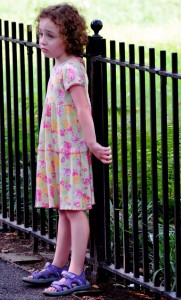east vs west vs choice: cultural standards of beauty

Image via Wikimedia Commons
For most of my childhood I remained blissfully oblivious to any notion of beauty standards. In primary school, I was always the ‘tomboy’ – someone who shunned the school dress for pants and a long sleeved polo and who spent lunchtimes playing rugby and soccer. Yet this wasn’t just a phase that characterised my pre-adolescent years. For several years into high school, I was very much unaware of the presumed awkward transition of puberty. It wasn’t that I didn’t notice my pimples and sudden growth spurt – it was just that I didn’t care.
I stumbled into feminism at the age of 15, and it was then I started looking at things from a critical viewpoint. Among numerous issues which suddenly arose was the topic of ‘beauty standards’- the social conditioning of women to conform to and maintain an ‘ideal’ body type. Yet during numerous discussions regarding this topic, I felt really uncomfortable because I felt I had never been influenced by these standards. I was an avid consumer of pop culture, film, music- all sorts of media with differing representations of women – yet the thought of having the ‘perfect’ body had never been something I had ever acted upon. I felt like an imposter – who was I to criticise if I felt like I had never been actively or consciously affected?
A lot of how I was brought up influenced how I currently perceive myself. My parents never really encouraged or discouraged me to adhere to typically white notions of beauty – they didn’t expect me to wear makeup, shave or to take care of facial hair. I can’t recall experimenting with any makeup. It wasn’t that I didn’t want to look better; it was just that I didn’t feel like it was necessary. Other than the odd lipstick at home, there weren’t any other forms of makeup product – my mum had completely shunned them after going through a major self esteem low in her 20s from wearing makeup on a day to day basis to wearing none at all. Even now, I can count the number of times on one hand that I’ve applied eyeliner.
Whenever this topic comes up in conversation – that I’ve never shaved, or rarely wear makeup – my friends express incredulity. The fact that I am not purposely shunning things that they do on a day to day basis often makes me feel very self-conscious. I don’t want to be seen as adopting a Grand Statement, or be seen as making a huge deal about my bodily choices – my choices are simply a part of me, and shouldn’t be elevated.
It’s not that I disapprove of people adhering to beauty standards. In the words of a friend: ‘It’s my choice.’ For her, wearing makeup and shaving her legs boosts her self-confidence and is for herself only – and I think that’s great. Yet still, for so many women, how they view themselves is based on cultural standards of beauty, and the reactions of men – for example treating catcalls as compliments, or basing one’s self-worth on the extent of male objectification. It is so important to acknowledge one’s choice and the reason behind that choice- for example acting on the impetus of social conditioning, or meeting cultural and patriarchal expectations purely as the result of one’s agency.
For me, being brought up by ethnically Chinese parents had a massive influence on choices I make now. My mum didn’t encourage me to shave simply because it was never a cultural condition in China the way it is in so many Western countries. She also didn’t encourage me to pluck away at my facial hair- this was something I picked up myself. Instead, she, and many of my relatives residing in China had completely different values in mind: women as behaving ‘lady-like’, feminine, always with grace, having long hair, being slim and petite, and having smaller feet is generally seen as more ‘elegant’.
Every time I go back to China, I become even more aware of the market that is aimed at young women. Women in China are not supposed to have tanned skin. There is a preference for larger eyes over smaller ones, having a double eyelid compared to a monolid and having a nose with a higher bridge- beauty standards which have drawn influence from the West, and are the result of the internalisation of Anglo-centric values. Caucasians residing in China are, on a general basis, treated so much better than their non-Caucasian counterparts. It is also exalted when a white person is able to speak the barest minimum of Chinese; when a Chinese person attempts to speak English in a predominantly white country, they are mocked compared to the attempts of their European counterparts.
I have a cousin who’s 14. She’s three years younger than me and currently lives in China. There’s no way to shield her from the monolith of values she will, and is currently facing: things imposed on her by society, standards seen as the ‘norm’ rather than options she can opt out of. Yet I don’t want to protect her, I want her to be exposed. I want her to critically view the way the female body is presented in society and from that make decisions which may or may not align with current standards – as long as it’s purely her choice.

